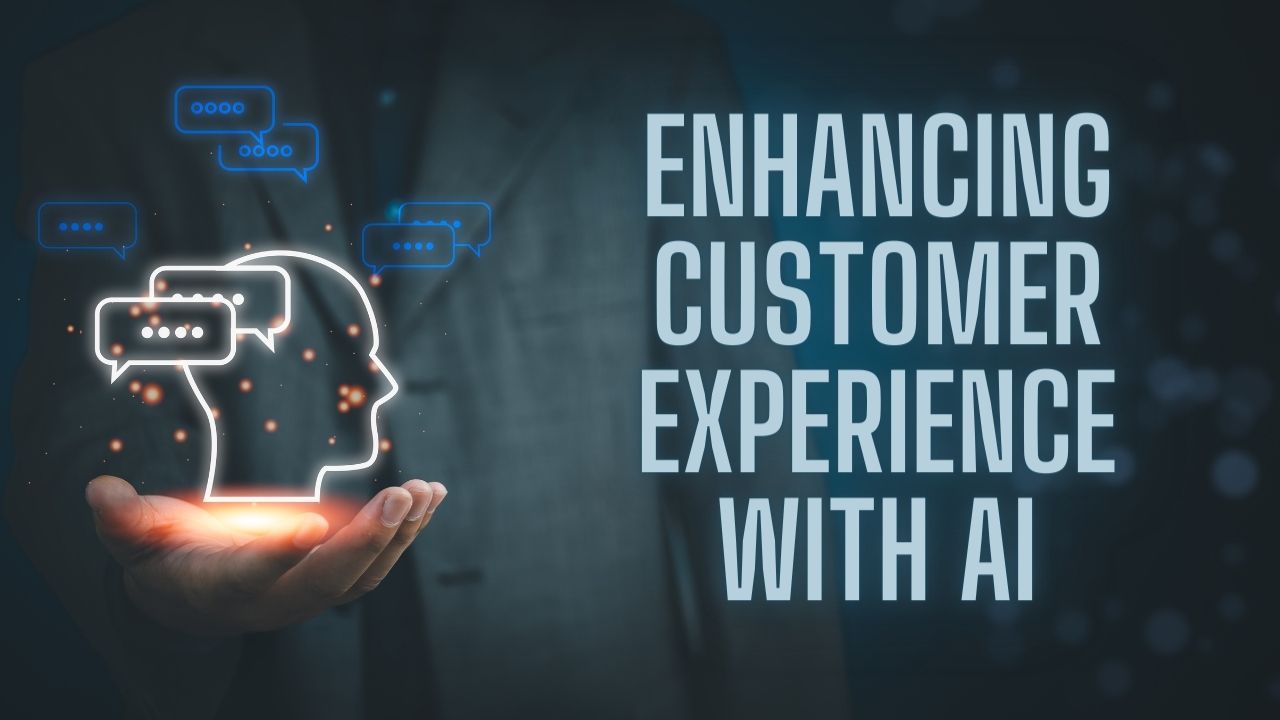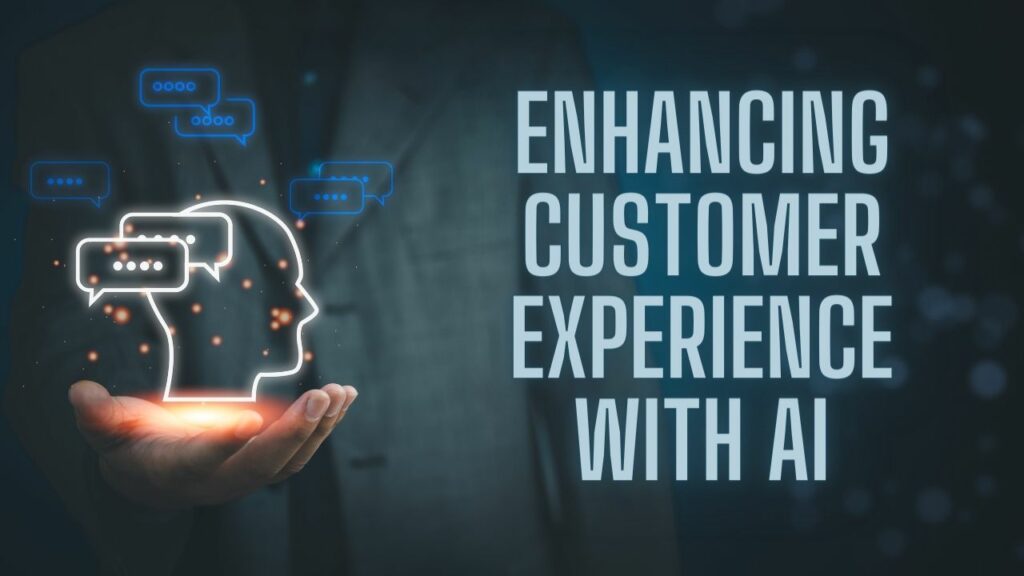 How to use AI Technology to Improve Customer Experience?
How to use AI Technology to Improve Customer Experience?
Artificial intelligence software and technology is becoming more and more common. What seemed like a distant fantasy is now made real and accessible to all kinds of businesses. It is not only limited to companies that primarily focus on tech or software, either. Its impact has spread to all kinds of industries that benefit from this kind of technology. One of these industries is the customer service field. Artificial intelligence (AI) can undoubtedly be a key factor in establishing client trust, enhancing the customer experience, as well as gathering customer insights. In this article, we will discuss enhancing customer experience with AI.
What Is AI in Customer Experience?

When businesses are equipped with artificial intelligence tools, they can deliver a more informed and improved user experience because of the different kinds of data that they can obtain. It is able to perform tasks such as analyzing client data, providing personalized suggestions, automating customer care interactions, and spotting patterns in customer behavior.
Customer experience AI tools usually focus on better understanding a business’s clients and offer them more individualized and effective experiences. An example of this is AI chatbots. They can be helpful in responding 24/7 to consumer inquiries with speed and accuracy, cutting down on wait times and raising customer satisfaction. There are also recommendation engines, which can examine client data to offer tailored product recommendations. This increases the likelihood of the customer purchasing the recommended product.
You might also like: Boosting Efficiency: How AI Is Improving Business Process Automation
Artificial intelligence and its role in improving the customer experience
One of the best aspects of using machine learning tools in customer service is that the quality remains consistent. This ensures that all customers that are interested in a business’s products and services can be accommodated. This encourages them to dedicate themselves to purchasing a product because of how “positive” the experience was.
All in all, using these artificial intelligence tools are used to enhance customer experience, brand perception, and retention.
Role of Artificial Intelligence (AI) in Customer Experience
1. Know Your Customer
Knowing the likes, dislikes, and needs of a customer is key to providing them with what they want. AI enables businesses to collect and analyze user data in real time. An example of this is the use of a particular branch of artificial intelligence: NLP (Natural Language Processing). It essentially allows you to keep up with changes in users’ expectations and behavior by obtaining feedback or predicting their next purchases.
2. Simplicity, Efficiency, and Productivity
The best kind of technology are ones that improve the existing processes that a business has. When it comes to AI, many tools and software are capable of making this possible. The technology automates repetitive activities through the use of chatbots and self-driving software, which reduces the time and effort needed to do repeated tasks by half.
Because of this, business operations become more straightforward, effective, and productive, further enhancing the customer experience. With machine and deep learning tools, employees and businesses can better focus on other ways that they can innovate in their field.
3. Better Decision Making
In terms of decision-making, we can treat artificial intelligence as the ideal business partner. This is because AI tools are best known for analyzing data to provide businesses with informed ideas and decisions. It has the ability to consider both past user interactions and current market trends. This makes it possible for companies to forecast the future, and figure out how to approach it. This kind of information is incredibly valuable, and it enables businesses to obtain significant market momentum if they make the right decisions.
4. Streamline Purchase Process
In online shopping, the tendency is for potential customers to add items to their carts, but never check out because of the website’s poor loading times or difficulties in checkout. Artificial intelligence can bridge this gap by comprehending the difficulties customers have and delivering a frictionless purchasing experience. This can help businesses reduce the percentage of the app “basket abandonment,” and further increase sales.
5. Fraud Detection
Fraud detection is one of the key uses of artificial intelligence in retail, finance, and other industries. Security is one of the biggest concerns for businesses, and different AI tools help in making it simple to spot any change in user behavior, which can collect, store, and compare user data in real time. This makes it easier to take prompt preventive action against fraud.
6. Customer Analytics
Data analysis is an incredibly large part of making a business successful. However, it can be quite expensive and time-consuming for employees to do. Machine learning tools and platforms can make this process simpler. AI software can collect a large amount of user data from many sources and arrange it properly according to important categories, such as demographics.
7. Self-Service
Nowadays, a lot of clients would rather handle everything themselves than hire an agent or ask a machine for assistance. Artificial intelligence makes it possible for customers to accomplish these things with different chatbots and recommendation tools. Artificial intelligence can also give useful insights into where clients get stopped and what doubts or questions prompt them to contact your support team
8. Visual, Text, and Voice engagement
Face recognition technology and virtual assistants are making it simpler to understand users’ feelings and sentiments at any given moment. This makes business efforts much more accessible to the public, which in turn can result in long-term profits.
9. Predictive Personalized Experience
Thanks to AI, startups and established organizations are efficiently evaluating user interaction data, forecasting users’ next moves, and using that knowledge to deliver them the ideal marketing offer. This greatly increases client engagement and profitability in the process. Businesses capitalize on creating the best personal experience for their audiences by using this information.
10. AI Improves Customer Retention Efforts
The better AI is developed and used by businesses, the greater one’s ability is to maintain a steady flow of consumers. Machine learning algorithms can assist businesses in identifying and preventing issues that could result in weak performances. This is possible with tools like uninstall tracking, for example. Uninstall tracking can provide insightful data that we can use to both fix customer retention issues and create winning re-engagement initiatives.
11. Marketing Becomes More Targeted and Effective
Big data and behavioral psychology can work together to improve one’s ability to forecast how customers will react to different marketing messages. This is possible because AI is now incredibly effective at understanding and influencing consumer behavior. Based on their behavior and psychological profiles, machine or deep learning tools can assist in identifying and segmenting different clients. In turn, businesses can develop customized messages that are more likely to persuade by better knowing the demands and interests. This can result in more frequent and impactful purchases.
12. Pre-Qualifying Leads Boost Conversion
Making the purchasing and browsing process simple for customers is key to maximizing profits. However, it can be difficult for more original and experimental items that haven’t been widely promoted to the public yet. Whenever customers have questions or inquiries about what a product does, employees don’t have to answer the same questions multiple times in a day. Artificial intelligence tools are capable of doing this.
AI chatbots can assist in addressing customer inquiries through preprogrammed questions and responses. Before referring a potential consumer to sales, they can also help determine whether a product is a good fit.
You might also like: The Importance of Natural Language Processing in Artificial Intelligence
Steps to Use AI for Delivering Better Customer Experience

1. Design a Customer Experience (CX) Strategy
In order to execute a good customer experience strategy, it has to be well-thought-out and planned first. Businesses must have a firm grasp on a collective CX vision and strategy that is unique to the company’s identity. This needs to be prioritized before examining how AI enhances the customer experience. Then, these ideas can be further talked about and developed by talking about “CX-based” expectations and the procedures to fulfill them.
2. Plan and Analyze User Journeys
It is important for businesses to know the thinking process of a customer. They connect with a business across a variety of touchpoints and platforms. These processes include discovery to pre-sales, sales, customer support, and post-purchase. Businesses can plan out an AI-based consumer experience by devoting time and effort to learning everything about all those connecting points.
3. Have a Clear Understanding of AI solutions
Projects and initiatives involving artificial intelligence require all kinds of strategies. We can apply these in recommendation engines, virtual assistants, predictive search engines, computer vision, and sentiment analysis tools, among others. Hence, businesses should figure out what kind of information they want to obtain from their consumers.
4. Decide Whether to Create or Buy AI solutions
The next step to think about when discussing how to enhance customer experience with AI is deciding whether to include it in an existing process or spend money on a ready-made CX solution.
Creating an original solution is the better choice if the business has an internal team of highly qualified AI experts. Investing in an existing AI tool can result in a lucrative contract if the software is capable of concentrating on important details while also understanding the customers’ problems.
5. Track and Measure Success
Using artificial intelligence in a CX strategy and then stepping aside is insufficient. To monitor the success rate of fusing AI with customer experience, key performance indicators (KPIs) and metrics needs close monitoring.
You might also like: Logistics Goes Intelligent: The Potential of AI in Supply Chain Management
Different Industries Delivering Higher Customer Experience With AI
1. Retail
Retail concerns any business that sells any type of goods directly to a consumer. This is why AI tools in the retail industry focus mostly on consumer behavior and patterns, or even product trends.
Machine learning has the ability to watch and analyze consumer behavior and purchase history. This information is then used to help determine the best time to distribute promotional offers or messages to catch customers’ attention.
2. Healthcare
We can integrate AI into many different systems in the healthcare industry. Examining a patient’s medical history and developing a course treatment with a higher possibility of success is possible with technology. We can also improve patient experience with the use of virtual nursing assistants. They can take care of everything from informing patients about when to take their medications to exchange real-time health information with the appropriate doctors.
3. Entertainment
AI tools are also being used in various entertainment platforms to make use of predictive analytics and other related fields. By clearly understanding user behavior, wants, and expectations, entertainment platforms can present customized options on the screen. This is increasing consumer loyalty and client retention rates, which will eventually lead to better profitability
4. Mobile Banking and Finance
The user experience in mobile banking and financial apps keeps on improving. Thanks to artificial intelligence. Chatbots are offering consumers advice around the clock and helping them in choosing the best financial strategy for themselves. It is also capable of identifying and reducing the risk of fraud in the processes, which eventually leads to higher customer retention.
Artificial intelligence is in some manner assisting a variety of businesses, including finance, sports, and education, in improving the consumer experience.
You might also like: A Beginner’s Guide to Deep Learning and Neural Networks
How can AI be used to improve customer service and customer experience?
The primary benefit of AI tools for businesses is their ability to offer personalized, effective, and efficient service to their clients, giving them a distinct competitive advantage.
How can AI help with customer engagement and retention?
AI tools help in shortening waiting times for customers and make the inquiry or purchasing process more seamless.
How Can AI Chatbots Help Enhance Customer Experience
Customers can feel more accommodated when engaging in conversations that directly address their needs. Also, through using chatbots and other AI tools, we can improve customer experience because it imitates real-life interactions with people.
You might also like: The Future of Marketing: Harnessing the Power of AI and Machine Learning in Marketing





